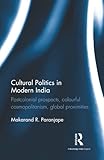Cultural politics in modern India : postcolonial prospects, colourful cosmopolitanism, global proximities / Makarand R. Paranjape.
Material type: TextPublication details: Abingdon, Oxon ; New York, NY : Routledge, 2016.Description: xii, 301 pages ; 23 cmISBN:
TextPublication details: Abingdon, Oxon ; New York, NY : Routledge, 2016.Description: xii, 301 pages ; 23 cmISBN: - 9781138956926
- 1138956929
- 954.04 23
- DS428.2 .P37 2016
| Item type | Current library | Call number | Status | Date due | Barcode |
|---|---|---|---|---|---|
 Books
Books
|
Symbiosis School for Liberal Arts | 320/PAR (Browse shelf(Opens below)) | Available | SSLA-B-7166 | |
 Books
Books
|
Symbiosis School for Liberal Arts | 306/par (Browse shelf(Opens below)) | Available | SSLA-B-4980 |
Browsing Symbiosis School for Liberal Arts shelves Close shelf browser (Hides shelf browser)
India's global proximities derive in good measure from its struggle against British imperialism. In its efforts to become a nation, India turned modern in its own unusual way. At the heart of this metamorphosis was a "colourful cosmopolitanism," the unique manner in which India made the world its neighbourhood. The most creative thinkers and leaders of that period reimagined diverse horizons. They collaborated not only in widespread anti-colonial struggles but also in articulating the vision of alter-globalization, universalism, and cosmopolitanism. This book, in revealing this dimension, offers new and original interpretations of figures such as Kant, Tagore, Heidegger, Gandhi, Aurobindo, Gebser, Kosambi, Narayan, Ezekiel, and Spivak. It also analyses cultural and aesthetic phenomena, from the rasa theory to Bollywood cinema, explaining how Indian ideas, texts, and cultural expressions interacted with a wider world and contributed to the making of modern India.











There are no comments on this title.